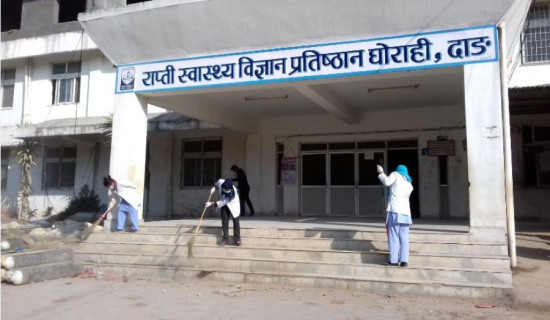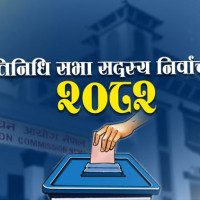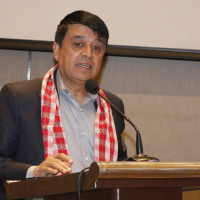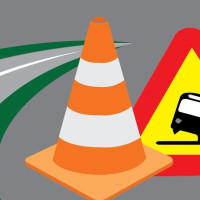- Sunday, 1 February 2026
We’ll make Urlabari a model municipality
Urlabari Municipality is the only municipality in Morang district to achieve a score of 85.5 in the Local Government Institutional Capacity Self-Assessment (LISA). Likewise, it has been successful to be the municipality with good governance in Koshi Province by scoring 84.4 in the Local Government Fiduciary Risk Assessment (FRA). Our Urlabari correspondent Hari Prasad Koirala recently talked to Urlabari Municipality Mayor Ganga Prasad Kharel about measures he has taken to maintain good governance and ensure the development of the municipality. Excerpts:
What important work have you done after assuming the office of Mayor?
It has been two years since I was elected. During this period, we have formulated the necessary laws and procedures to work effectively. We then focused on good governance and made significant improvements in the education and health sectors. We have implemented local curriculums in schools and improved their infrastructures. By addressing basic needs such as drinking water and toilets, we have increased the attractiveness of government schools.
There have been many improvements in the health sector. We provided free health insurance to 1,700 extremely poor families. Additionally, we started yoga training in every ward to prevent diseases. We believe economic, social, cultural and moral education is needed for people to stay healthy. We have established basic health centres in each ward and urban health centres as needed. We have also fully equipped the Rajghat Ayurveda Hospital.
We have arranged irrigation to bring water to the farmers' fields. We replaced the random subsidy system in agriculture with free soil testing. Additionally, we have integrated five drinking water projects within the municipality and formed a directive committee. Our goal is to provide clean drinking water to all wards within the next one and a half years, and we are close to achieving it.
The construction of the Bakraha Bishnu Ganga Ghat, a mega project, is in its final stage. The municipality has already brought more than five bighas of river uplift land under its jurisdiction. We are discussing how to use the land, either for settlement construction or other purposes.
We have declared 36 per cent of the total area of the municipality as an agricultural zone. Out of the 30 land ownership certificates issued in the municipality, eight have been distributed. Similarly, 422 land ownership certificates are in the final stage of distribution.
What are the main bases for making Urlabari Municipality prosperous?
Urlabari can achieve prosperity through agriculture, animal husbandry and tourism. We are facilitating farmers to increase agricultural production by conducting free soil tests and promoting the use of organic fertilisers. We have several natural attractions such as Beteni Wetland, Lampate Wetland and Budhathakur Wetland. The municipality is currently working on promoting these sites.
Urlabari also hosts unique places like the Madan Bhandari Memorial Museum and the Dhimal Ethnic Development Centre, which are worth visiting. With sufficient investment in enhancing the beauty of these sites, Urlabari can become a hub for domestic tourism.
Meanwhile, the municipality is also working in areas of animal farming. We have achieved self-sufficiency in milk production and are working towards self-sufficiency in vegetable production. We have started commercial flower production and are also planning to achieve self-sufficiency in flowers as well.
What is the state of the municipality's internal economic resources?
Last year, the municipality's internal revenue was Rs. 50 million. In the current fiscal year, it is expected to exceed Rs. 80 million. Our primary focus is to increase the municipality's internal revenue to end our dependency.
We are organising house rent tax, streamlining income from river-based resources, certifying river-based materials more scientifically and ensuring the timely collection of royalties from community forests to make the local government self-reliant.
The municipality has six agricultural markets. If these markets are organised, the municipality's internal resources will be enough to undertake minor development projects without relying on federal or provincial governments.
What major projects are currently being implemented in the municipality?
A 5.5-kilometre road is being blacktopped in Ward no. 2 with financial assistance from the World Bank. Rural Reconstruction Nepal (RRN) has agreed to provide a project worth Rs. 270 million. Additionally, six kilometres of the embankment have been constructed with the support of the World Bank under the Ratuwa Mawa Embankment Project and Koshi Bakraha Embankment Project.
A Rs. 600 million project for six municipalities has been approved for the reduction of women's violence. Urlabari is the only municipality in Morang to be included in that project. Additionally, large projects are being implemented in the municipality not only from local resources, the federal and provincial governments but also with the support of donor organisations.
What development projects cannot be completed with the municipality's budget?
Many bridges are needed. Several roads still need to be blacktopped. Making bridges and blacktopping roads are not possible with the municipality's limited resources. Although the construction of the Jhumraha Bridge has been designated as a pride project of the municipality, it has not yet been completed. A bridge needs to be constructed over the Solti River along the road from Ramnagar to the new building of the Area Administration Office. Roads such as Bhanumarga–Lamatole to Chaudhary settlement and Aitabare-Miklajung need to be blacktopped. These projects are also not feasible with local resources alone. We are also unable to achieve sustainable waste management in Urlabari.
What are the major challenges in the development?
Urlabari Municipality faces many challenges. Due to the lack of proper drainage systems, water cannot be drained during the rainy season, causing some areas to flood. There are seven rivers and they damage embankments every year. We have repeatedly approached the federal and provincial governments for sustainable embankments but the problem remains unresolved. Poor people are dying as they cannot afford medical treatments. And, the municipality has not been able to provide sufficient support for their treatment.
Meanwhile, establishing a permanent and sustainable solution for waste management through the construction of a dumping site is a major challenge. Soil testing has begun for the reconstruction of the municipal bus park that has been abandoned for the past 10 years. After many efforts, the Municipal Development Fund has finally approved Rs. 220 million for the project. We have not been able to reduce the use of pesticides and chemical fertilisers in agriculture. However, with the recent establishment of organic fertiliser industries, there has been some relief.
What can other local governments learn from Urlabari Municipality?
Urlabari is a municipality that provides free mortuary van and ambulance services. We provide funeral materials worth up to Rs. 12,000 to extremely poor families. Despite having a majority, we make decisions based on all-party consensus. There has been no controversy in making new decisions. Development is not just about building roads and bridges, it also involves promoting physical, mental, economic and educational well-being. That’s why we have introduced yoga programmes in every ward.
Do you have anything to add at the end?
We are committed to making Urlabari a corruption-free municipality. Our goal is to become a model municipality in the country by maintaining the achievements we have made and promoting good governance. Even if we cannot do exceptionally well, we should at least avoid doing poorly. Citizens have endless needs, and it is challenging to meet them all, but it is possible. If citizens maintain a positive attitude and cooperate with the municipality, we can make Urlabari a model municipality.
How did you feel after reading this news?









-original-thumb.jpg)







